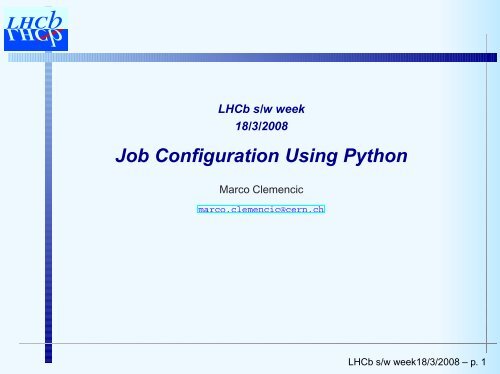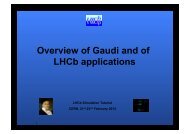Job Configuration Using Python
Configurables - CERN
Configurables - CERN
- No tags were found...
You also want an ePaper? Increase the reach of your titles
YUMPU automatically turns print PDFs into web optimized ePapers that Google loves.
LHCb s/w week<br />
18/3/2008<br />
<strong>Job</strong> <strong>Configuration</strong> <strong>Using</strong> <strong>Python</strong><br />
Marco Clemencic<br />
marco.clemencic@cern.ch<br />
LHCb s/w week18/3/2008 – p. 1
Overview<br />
◮ Introduction<br />
◮ Changes since March<br />
◮ Tutorial<br />
◮ Foreword<br />
◮ Low level configuration<br />
◮ Extensions<br />
◮ High level configuration<br />
LHCb s/w week18/3/2008 – p. 2
Introduction<br />
LHCb s/w week18/3/2008 – p. 3
Changes since March<br />
◮ Few bug-fixes (see Gaudi release notes)<br />
LHCb s/w week18/3/2008 – p. 4
Tutorial<br />
LHCb s/w week18/3/2008 – p. 5
Forewords/1<br />
Some preliminary comments are needed to enter the<br />
correct state of mind:<br />
◮ <strong>Job</strong> Options files are configuration files<br />
◮ C++-like syntax without checking<br />
◮ Simple parser<br />
◮ <strong>Python</strong> is a OOP language<br />
◮ we have to deal with classes and objects<br />
◮ <strong>Configuration</strong> IS NOT execution<br />
◮ do not confuse it with Gaudi<strong>Python</strong><br />
LHCb s/w week18/3/2008 – p. 6
Forewords/2<br />
◮ The <strong>Python</strong> configuration is based on<br />
Configurables<br />
◮ Configurables are special <strong>Python</strong> classes built<br />
from the C++ components<br />
(Services, Algorithms, Tools, . . . )<br />
◮ Each Configurable instance has got a name that is<br />
unique by constructions<br />
LHCb s/w week18/3/2008 – p. 7
How to Run<br />
Gaudi.exe is replaced by gaudirun.py:<br />
> gaudirun.py --help<br />
Usage: gaudirun.py [options] ...<br />
Options:<br />
-h, --help show this help message and exit<br />
-n, --dry-run do not run the application, just parse option files<br />
-p FILE, --pickle-output=FILE<br />
write the parsed options as a pickle file (static<br />
option file)<br />
-v, --verbose print the parsed options<br />
--old-opts format printed options in old option files style<br />
--all-opts print all the option (even if equal to default)<br />
--option=OPTION append the provided (<strong>Python</strong>) option to the<br />
configuration.All options lines are executed, one<br />
after the other, in the same context.<br />
LHCb s/w week18/3/2008 – p. 8
Features of gaudirun.py<br />
◮ Backward compatible<br />
◮ Print the result of the configuration as <strong>Python</strong><br />
dictionary or old options<br />
◮ Parse the option files without running the<br />
application<br />
◮ Dump the final configuration as a pickle file<br />
◮ Accept more than 1 option file on the command<br />
line<br />
LHCb s/w week18/3/2008 – p. 9
Example<br />
> SetupProject Brunel<br />
Environment for Brunel v33r2 ready.<br />
(taken from /afs/cern.ch/lhcb/software/releases/BRUNEL)<br />
> gaudirun.py -v -n $BRUNELOPTS/Brunel-Default.py<br />
...<br />
# Dumping all configurables and properties (different from default)<br />
{’ApplicationMgr’: {’AppName’: ’Brunel’,<br />
’AppVersion’: ’v33r2’,<br />
’AuditAlgorithms’: True,<br />
’ExtSvc’: [’DetDataSvc/DetectorDataSvc’,<br />
...<br />
’AuditorSvc’],<br />
’HistogramPersistency’: ’ROOT’,<br />
’OutStream’: [’DstWriter’],<br />
’TopAlg’: [’GaudiSequencer/BrunelSequencer’]},<br />
’AuditorSvc’: {’Auditors’: [’TimingAuditor’]},<br />
...<br />
LHCb s/w week18/3/2008 – p. 10
Basic <strong>Configuration</strong><br />
LHCb s/w week18/3/2008 – p. 11
Headers<br />
<strong>Python</strong> needs to know which classes and functions<br />
you are going to use:<br />
# import standard configurables and modules<br />
from Gaudi.<strong>Configuration</strong> import *<br />
# import non-standard configurables<br />
from Configurables import MyAlgorithm, MyTool<br />
◮ The first line should be present in all <strong>Python</strong> option<br />
files.<br />
◮ The second line may not be needed.<br />
(Gaudi standard configurables like ApplicationMgr<br />
are always available)<br />
LHCb s/w week18/3/2008 – p. 12
Units<br />
In .opts files it was possible to use units.<br />
In <strong>Python</strong> you have to import the symbols from a<br />
special module:<br />
# import all the units<br />
from GaudiKernel.SystemOfUnits import *<br />
or (better)<br />
# import only the needed units<br />
from GaudiKernel.SystemOfUnits import GeV, ns, ms<br />
◮ Warning: importing all the units may conflict with<br />
your variables.<br />
LHCb s/w week18/3/2008 – p. 13
Basic usage<br />
◮ Import (include) other option files<br />
importOptions("myOldConf.opts")<br />
importOptions("myNewConf.py")<br />
importOptions("myPreparsedConf.pkl")<br />
◮ Configure a service or an algorithm<br />
alg1 = MyAlgorithm("MyAlg1")<br />
alg1.AProperty = 1.234<br />
svc1 = MySpecialSvc("MySvc")<br />
svc1.OutputLevel = INFO<br />
◮ Use the configured service or algorithm<br />
app = ApplicationMgr()<br />
app.TopAlg.append(alg1)<br />
app.ExtSvc += [ svc1 ]<br />
LHCb s/w week18/3/2008 – p. 14
Tools<br />
◮ Two flavors: public and private<br />
◮ <strong>Configuration</strong> depends on the usage:<br />
◮ public<br />
1. tool("MyTool","TheTool")<br />
tool("MyTool/TheTool")<br />
2. tool(m_typename)<br />
3. tool(m_type,m_name)<br />
4. tool(m_type,"TheTool")<br />
◮ private<br />
1. tool("MyTool","TheTool",this)<br />
tool("MyTool/TheTool",this)<br />
2. tool(m_typename,this)<br />
3. tool(m_type,m_name,this)<br />
4. tool(m_type,"TheTool",this)<br />
◮ mixed<br />
LHCb s/w week18/3/2008 – p. 15
Public Tools: case 1<br />
◮ tool("MyTool","TheTool")<br />
◮ tool("MyTool/TheTool")<br />
Old style:<br />
ToolSvc.TheTool.PropertyOfTheTool = "ABC";<br />
<strong>Python</strong> style:<br />
tool = MyTool("TheTool")<br />
tool.PropertyOfTheTool = "ABC"<br />
Not flexible: should be avoided.<br />
LHCb s/w week18/3/2008 – p. 16
Public Tools: case 2<br />
◮ tool(m_typename)<br />
Old style:<br />
MyAlg.ToolTypeName = "MyTool/TheTool";<br />
ToolSvc.TheTool.PropertyOfTheTool = "ABC";<br />
<strong>Python</strong> style:<br />
tool = MyTool("TheTool")<br />
tool.PropertyOfTheTool = "ABC"<br />
alg1.ToolTypeName = tool<br />
LHCb s/w week18/3/2008 – p. 17
Public Tools: case 3<br />
◮ tool(m_type,m_name)<br />
Old style:<br />
MyAlg.ToolType = "MyTool";<br />
MyAlg.ToolName = "TheTool";<br />
ToolSvc.TheTool.PropertyOfTheTool = "ABC";<br />
<strong>Python</strong> style:<br />
tool = MyTool("TheTool")<br />
tool.PropertyOfTheTool = "ABC"<br />
alg1.ToolType = tool # 2nd property ignored<br />
LHCb s/w week18/3/2008 – p. 18
Public Tools: case 4<br />
◮ tool(m_type,"TheTool")<br />
Old style:<br />
MyAlg.ToolType = "MyTool";<br />
// or<br />
MyAlg.TheTool = "MyTool";<br />
ToolSvc.TheTool.PropertyOfTheTool = "ABC";<br />
<strong>Python</strong> style:<br />
tool = MyTool("JustAName") # the hardcoded name is ignored<br />
tool.PropertyOfTheTool = "ABC"<br />
alg1.ToolType = tool<br />
LHCb s/w week18/3/2008 – p. 19
Private Tools: case 1<br />
◮ tool("MyTool","TheTool",this)<br />
◮ tool("MyTool/TheTool",this)<br />
Old style:<br />
MyAlg.TheTool.PropertyOfTheTool = "ABC";<br />
<strong>Python</strong> style:<br />
alg1.addTool(MyTool, name = "TheTool")<br />
alg1.TheTool.PropertyOfTheTool = "ABC"<br />
LHCb s/w week18/3/2008 – p. 20
Private Tools: case 2<br />
◮ tool(m_typename,this)<br />
Old style:<br />
MyAlg.ToolTypeName = "MyTool/TheTool";<br />
MyAlg.TheTool.PropertyOfTheTool = "ABC";<br />
<strong>Python</strong> style:<br />
alg1.addTool(MyTool, name = "TheTool")<br />
alg1.TheTool.PropertyOfTheTool = "ABC"<br />
alg1.ToolTypeName = alg1.TheTool<br />
# or<br />
alg1.addTool(MyTool, name = "ToolTypeName")<br />
alg1.ToolTypeName.PropertyOfTheTool = "ABC"<br />
LHCb s/w week18/3/2008 – p. 21
Private Tools: case 3<br />
◮ tool(m_type,m_name,this)<br />
Old style:<br />
MyAlg.ToolType = "MyTool";<br />
MyAlg.ToolName = "TheTool";<br />
MyAlg.TheTool.PropertyOfTheTool = "ABC";<br />
<strong>Python</strong> style:<br />
alg1.addTool(MyTool, name = "TheTool")<br />
alg1.TheTool.PropertyOfTheTool = "ABC"<br />
alg1.ToolType = alg1.TheTool<br />
# or<br />
alg1.addTool(MyTool, name = "ToolType")<br />
alg1.ToolType.PropertyOfTheTool = "ABC"<br />
LHCb s/w week18/3/2008 – p. 22
Private Tools: case 4<br />
◮ tool(m_type,"TheTool",this)<br />
Old style:<br />
MyAlg.ToolType = "MyTool";<br />
// or<br />
MyAlg.TheTool = "MyTool";<br />
MyAlg.TheTool.PropertyOfTheTool = "ABC";<br />
<strong>Python</strong> style:<br />
alg1.addTool(MyTool, name = "ToolType")<br />
alg1.ToolType.PropertyOfTheTool = "ABC"<br />
# or<br />
alg1.addTool(MyTool, name = "TheTool")<br />
alg1.TheTool.PropertyOfTheTool = "ABC"<br />
LHCb s/w week18/3/2008 – p. 23
Forcing Public Tools<br />
◮ tool(m_typename,this)<br />
with m_typename ending with “:PUBLIC”<br />
Old style:<br />
MyAlg.ToolTypeName = "MyTool/TheTool:PUBLIC";<br />
ToolSvc.TheTool.PropertyOfTheTool = "ABC";<br />
<strong>Python</strong> style:<br />
tool = MyTool("TheTool")<br />
tool.PropertyOfTheTool = "ABC"<br />
alg1.ToolTypeName = tool.getFullName() + ":PUBLIC"<br />
LHCb s/w week18/3/2008 – p. 24
Tools: Suggestions<br />
◮ Public tools<br />
◮ use case 2: easier to handle<br />
tool(m_typename)<br />
◮ Private tools<br />
◮ case 2 is better<br />
(easier if tool and property have the same name)<br />
LHCb s/w week18/3/2008 – p. 25
High Level <strong>Configuration</strong><br />
LHCb s/w week18/3/2008 – p. 26
High Level <strong>Configuration</strong><br />
◮ Old .opts files<br />
◮ collection of files, one per use-case<br />
◮ files with a lot of includes, one per<br />
super-use-case (see Panoramix)<br />
◮ custom configuration: comment and<br />
uncomment lines<br />
◮ <strong>Python</strong><br />
◮ preconfigured components<br />
◮ functions<br />
◮ high level configurables<br />
LHCb s/w week18/3/2008 – p. 27
Preconfigured Components<br />
It is possible to create a pool of pre-configured tools,<br />
algorithms or services. The user can choose which<br />
one of them to use.<br />
◮ “preconfigured_analysis.py”<br />
# Preconfigured algorithms<br />
MyAlg("preconf Selection1").Cut = 10 * MeV<br />
MyAlg("preconf Selection2").Cut = 15 * MeV<br />
◮ “my_configuration.py”<br />
importOptions("preconfigured analysis.py")<br />
ApplicationMgr().TopAlg.append(MyAlg("preconf Selection1"))<br />
LHCb s/w week18/3/2008 – p. 28
Functions (2)<br />
To provide configuration functions you need to:<br />
◮ put your functions in the file<br />
python//<strong>Configuration</strong>.py<br />
◮ add to the requirements the line<br />
apply_pattern install_python_modules<br />
See the example in the package Det/DetCond.<br />
LHCb s/w week18/3/2008 – p. 30
High Level Configurables<br />
In some cases you need to collect informations to be<br />
used to prepare the actual low level configuration.<br />
# examples<br />
from GaudiConf.<strong>Configuration</strong> import *<br />
LHCbApp().condDBtag = "2008-default"<br />
from Boole.<strong>Configuration</strong> import *<br />
Boole().useSpillover = False<br />
Boole().writeRawMDF = True<br />
Example of definition:<br />
class LHCbApp(ConfigurableUser):<br />
slots = {}<br />
Note: It is possible to write user-defined configurables, but the development is ongoing.<br />
LHCb s/w week18/3/2008 – p. 31
The future<br />
LHCb s/w week18/3/2008 – p. 32
To Do<br />
◮ Implement automatic and generic handling of high<br />
level configurables<br />
◮ Simplify the configuration of tools<br />
e.g. for default tools as in DVAlg<br />
◮ Fix bugs. . . when reported<br />
LHCb s/w week18/3/2008 – p. 33
Thank you for your attention!<br />
LHCb s/w week18/3/2008 – p. 34







